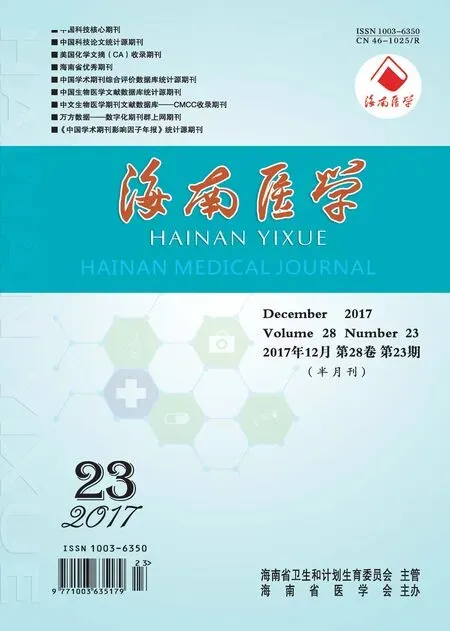术后认知功能障碍的危险因素及预防
苏文良,王丹风 综述 田毅 审校
(中南大学湘雅海口医院麻醉科,海南 海口 570100)
术后认知功能障碍的危险因素及预防
苏文良,王丹风 综述 田毅 审校
(中南大学湘雅海口医院麻醉科,海南 海口 570100)
术后认知功能障碍(POCD)是麻醉与手术后出现的一种中枢神经系统疾病,其在临床中尤其是老年患者中并非少见,由于POCD可对患者生活质量造成严重影响,给个人、家庭、社会带来巨大负担。近年来,POCD的危险因素及预防倍受关注,研究成果为临床预测、预防、治疗提供新的思路。
术后认知功能障碍;危险因素;预防
术后认知功能障碍(POCD)是麻醉、手术后中枢神经系统的并发症之一,是老年人术后常见的严重并发症,即便发生轻微的认知功能损伤,也会对老年患者的生活质量造成严重影响,且与阿尔兹海默病和过早死亡有关。POCD不仅严重影响患者运动功能、日常生活能力的恢复,更直接影响患者社会适应能力,给患者重返社会带来困难。已成为围术期管理的重点和难点。了解临床相关危险因素的研究现状对POCD的临床工作具有重要的指导意义。
1 POCD的特点及发病率
POCD是术前无精神障碍的患者在术后出现的中枢神经系统并发症,表现为定向、思维、记忆、注意力、自知力等认知能力的改变,其不会在术前和术后的短时间内发病,特点为长期稳定的认知功能的可逆损害,病程可持续到术后数月[1],与谵妄、阿尔兹海默病相混淆。术后谵妄常表现为外科手术后精神状态的急剧变化,注意力不集中、意识水平降低超过24 h。术后谵妄在年轻和老年患者均可发生,其中老年患者的发病率更高。与POCD相比,谵妄的临床表现多为精神方面,常见症状为短期内注意力分散、感觉能力下降、认知功能下降等,术后谵妄精神错乱大多发生于手术后1~7 d,通常具有可逆性并常伴有严重的全身症状如心动过速、多汗、过度通气等。POCD因具有进行性认知功能受损的特点而易于与术后谵妄相鉴别。而阿尔兹海默病为一种慢性的、不可逆的进行性疾病,主要发患者群为老年人,往往在术前和麻醉前已经发病,手术和麻醉可加重此病。记忆障碍是阿尔兹海默病的特征之一,患者解决问题、决策、判断和定向的能力常受损伤。此外,阿尔兹海默病也常伴有人格改变。
Evered等[2]分析表明,术后7 d,接受全髋置换手术(THR)的患者POCD的发病率为17%,冠脉旁路搭桥术(CABG)后POCD的发病率为43%;术后3个月,镇静状态下冠脉造影术后的发病率为21%,CABG术后发病率为16%,THR术后发病率为16%。
2 POCD的危险因素
2.1 术前因素与POCD POCD的术前危险因素包括年龄、术前认知障碍(未诊断轻度认知功能障碍、血管性痴呆、阿尔兹海默病或其他痴呆)、脑功能受损、CABG手术史、肺部疾病、酗酒、电解质紊乱(药物所致或因脱水)、精神药物、代谢性疾病、术前谵妄等,其中高龄更是独立危险因素[3-13]。相关研究表明,糖化血红蛋白(HbA1c)升高可明显增加POCD的患病风险[13],麻醉前给予咪达唑仑可加重POCD,而山莨菪碱对POCD没有明显影响[14]。Hovens等[15]研究了术前潜在感染对手术炎症期大鼠认知功能的影响,结果表明,术前潜在感染可加重术后炎症反应和认知功能障碍;积极纠正术前感染等危险因素可大大降低POCD的发病率。
2.2 术中危险因素 术中低血压、缺氧、栓塞、药物和术中感染已被证实为导致POCD的危险因素。
2.2.1 麻醉因素 局部麻醉药物与全身麻醉药物均可参与术后长期认知功能障碍的形成[16-17]。陈莹莹等[18]研究表明,羟考酮用于结肠镜诊疗术时,患者术后早期POCD的发病率相对高于芬太尼和氢吗啡酮。一些研究结果表明,七氟烷麻醉可增加POCD的发病率,并且幼儿期七氟烷暴露史会增加远期POCD的发生风险[19-20]。但Evered等[2]的研究结果不只支持麻醉与POCD的相关性。现有大样本研究均认为麻醉方式的选择对认知结果没有影响。
2.2.2 血压 多项研究分析了心脏手术中低血压和认知能力下降之间的关系。结果表明,大脑在麻醉过程中代谢需求降低,低血压多不会引起脑组织灌注不足;然而,低血压会因减弱栓子清除能力,而影响脑血流自动调节的效率。Gold等[21]研究结果指出,体外循环(CPB)期间,维持相对较低的平均动脉压(45~60 mmHg,1 mmHg=0.133 kPa)时,脑卒中发病率为7.2%,而相对较高的平均动脉压(80~110 mmHg)时,脑卒中发病率为2.4%。术后6个月随访结果表明,两者神经功能下降患者的比例分别为11%和12%。Siepe等[22]研究发现,接受CABG的患者CPB期间在脑氧饱和度相似情况下,平均动脉压在60~70 mmHg的患者POCD发病率远高于维持平均动脉压80~90 mmHg的患者。总体而言,现有研究似乎支持手术过程中持维持一个足够高的平均动脉血压对保护脑灌注是非常重要的。
2.2.3 脑血流自动调节 对认知能力的影响发挥作用的重要机制并非是平均动脉压本身,而是大脑血流的自动调节(CA)以适应血压和氧饱和度的变化能力。调查心脏手术中CA适应血压的变化的研究发现,很大一部分POCD患者是由于难以通过自动调节维持术中脑血流[23]。Patel等[24]在两项研究中发现术后6周认知功能下降与CA能力下降有关。Newman等[25]通过215例患者CA的分析,指出CA的下降并不能解释认知功能障碍,而氧耗增加可能与认知功能下降有关,即脑的氧供需失衡可能导致POCD。相关研究表明某些麻醉药物可严重抑制脑血流的调节能力[26]。Goettel等[27]研究指出,术中的脑血流量自动调节功能受损并不能有效预测非心脏手术POCD的发生。但大多数研究似乎更倾向于支持CA对POCD的影响。
2.2.4 炎症反应与POCD 最近的证据表明,炎症反应可加剧老年人POCD的发病率,并且此作用随老年人的年龄增长而增加。此学说虽可能解释在老年人群的POCD高风险性,但并不能完全解释不同老年人POCD不同发展结局。海马作为大脑边缘系统的重要组成部分,在学习、记忆以及情绪活动的调节中起重要作用,Hem等[28]通过对颅内手术诱导海马内的炎症反应研究发现,海马的炎症反应可能是POCD的重要危险因素。Tang等[29]也证实了胰岛素抵抗增加POCD的发生与炎症因子的增加有关。Zhu等[30]研究发现围手术期输血超过3个单位红细胞是老年患者全髋关节置换术后POCD的独立危险因素。同时,越来越多的证据表明,输血治疗往往改善生存,甚至可能导致不良后果。相关机制包括输血与感染易感性增加、免疫致敏、输血相关的肺损伤、加重应激损伤、术后全身炎症反应等。
2.3 术后因素与POCD 术后疼痛可能是POCD发生的致病因素[31]。相比静脉镇痛,局麻药物复合阿片类药物的局部镇痛效果更好,且可以有效减少POCD[32-33]。此外,在术后口服镇痛药患者的POCD发病率低于静脉镇痛的患者[34]。
3 POCD的预防及治疗
POCD的病理生理机制尚不完全清楚,仍没有公认的有效干预措施以降低其发生率。在心脏外科手术中,七氟烷或地氟烷替代丙泊酚可减少早期POCD。七氟烷脑保护作用可减轻经体外循环的心脏手术POCD[35-36]。且七氟烷可对不同器官的缺血性损伤进行预处理,而且其可能的抗炎作用也可以防止POCD[37]。但至今仍没有足够的数据支持七氟烷或任何其他麻醉物可有效避免POCD。
纠正心脏手术期间脑氧饱和度下降并不减少冠状动脉旁路移植术患者POCD发生率,因为改善脑氧合或改变麻醉的类型似乎对预防POCD并不是很有效,而神经保护剂如利多卡因、他汀类对预防POCD更加有效[38]。研究表明,右美托咪定可抑制炎症反应。右美托咪定可降低脓毒血症大鼠的血清中炎症因子白细胞介素-6(IL-6)的水平,抑制炎性反应[39]。Zhao等[40]证实右美托咪定可以抑制脂多糖诱导的肿瘤坏死因子-α、IL-6、白细胞介素-8、高迁移率族蛋白等炎性因子的产生。Qi等[41]认为尼莫地平和7.5%高渗盐水预处理对老年大鼠术后认知功能均具有较好的保护作用,其与海马神经元凋亡的抑制有关。有研究发现乌司他丁治疗早期POCD减少术后两天IL-6和s100蛋白浓度是有效的[42-43]。Wu等[44]发现姜黄素可防止POCD,其机制可能是通过提高抗氧化酶的活性,脑源性神经营养因子信号激活,中和胆碱能功能障碍。Lin等[45]认为脑氧饱和度(rSO2)可作为POCD的重要预测指标,使用rSO2监测指导麻醉常可减小脑缺血缺氧的潜在风险,可改善脑功能,降低POCD的发生率,缩短住院时间、PACU滞留时间。Ballard等[1]的研究结果表明术中监测麻醉深度、rSO2可降低术后认知功能障碍。
4 结 语
POCD的发病机制至今仍是未解的临床问题,对于POCD的临床诊断、认知功能的测评、诊断的标准仍未统一,各研究中得出的数据结论仍具有不确定性,今后的研究需多学科、多因素综合考量POCD的研究,以求对POCD早预防、早发现、早诊断、早治疗。
[1]Ballard C,Jones E,Gauge N,et al.Optimised anaesthesia to reduce post operative cognitive decline(POCD)in older patients undergoing elective surgery,a randomised controlled trial[J].PLoS One,2012,7(6):e37410.
[2]Evered L,Scott DA,Silbert B,et al.Postoperative cognitive dysfunction is independent of type of surgery and anesthetic[J].Anesth Analg,2011,112(5):1179-1185.
[3] Sachdev PS,Valenzuela M.Brain and cognitive reserve[J].Am J Geriatr Psychiatry,2009,17(3):175-178.
[4]Moller JT,Cluitmans P,Rasmussen LS,et al.Long-term postoperative cognitive dysfunction in the elderly ISPOCD1 study.ISPOCD investigators.International Study of Post-Operative Cognitive Dysfunction[J].Lancet,1998,351(9106):857-861.
[5]Monk TG,Weldon BC,Garvan CW,et al.Predictors of cognitive dysfunction after major noncardiac surgery[J].Anesthesiology,2008,108(1):18-30.
[6]Silbert B,Evered L,Scott DA,et al.Preexisting cognitive impairment is associated with postoperative cognitive dysfunction after hip joint replacement surgery[J].Anesthesiology,2015,122(6):1224-1234.
[7]Willis SL,Schaie KW.Cognitive training and plasticity:theoretical perspective and methodological consequences[J].Restor Neurol Neurosci,2009,27(5):375-389.
[8]Arrowsmith JE,Grocott HP,Reves JG,et al.Central nervous system complications of cardiac surgery[J].Br J Anaesth,2000,84(3):378-393.
[9]Freter S,Dunbar M,Koller K,et al.Prevalence and characteristics of pre-operative delirium in hip fracture patients[J].Gerontology,2016,62(4):396-400.
[10]Gvozdenović L,Antanasković A.History of alcohol abuse after major non-cardiac surgery and postoperative cognitive dysfunction[J].Eur J Intern Med,2015,26(9):e51.
[11]Messerotti Benvenuti S,Patron E,Zanatta P,et al.Preexisting cognitive status is associated with reduced behavioral functional capacity in patients 3 months after cardiac surgery:an extension study[J].Gen Hosp Psychiatry,2014,36(4):368-374.
[12]Saleh AJ,Tang GX,Hadi SM,et al.Preoperative cognitive intervention reduces cognitive dysfunction in elderly patients after gastrointestinal surgery:a randomized controlled trial[J].Med Sci Monit,2015,21(1):798-805.
[13]Feinkohl I,Winterer G,Pischon T.Diabetes is associated with risk of postoperative cognitive dysfunction:A meta-analysis[J].Diabetes Metab Res Rev,2017,33(2):116-119.
[14]王珑,张惠曼,王宏,等.麻醉前给予不同药物对小鼠术后认知功能的影响[J].中国临床研究,2017,30(2):251-253.
[15]Hovens IB,van Leeuwen BL,Nyakas C,et al.Prior infection exacerbates postoperative cognitive dysfunction in aged rats[J].Am J Physiol Regul Integr Comp Physiol,2015,309(2):R148-R159.
[16]Newman S,Stygall J,Hirani S,et al.Postoperative cognitive dysfunction after noncardiac surgery:a systematic review[J].Anesthesiology,2007,106(3):572-590.
[17]Yin J,Wang SL.The effects of general anaesthesia on memory in children:a comparison between propofol and sevoflurane[J].Anaesthesia,2014,69(2):118-123.
[18]陈莹莹,张宗泽,刘汉兴,等.氢吗啡酮或羟考酮复合丙泊酚对结肠镜诊疗术后患者认知功能的影响[J].贵州医科大学学报,2017,42(2):194-197.
[19]Zheng JW,Meng B,Li XY,et al.NF-kappaB/P65 signaling pathway:a potential therapeutic target in postoperative cognitive dysfunction after sevoflurane anesthesia[J].Eur Rev Med Pharmacol Sci,2017,21(2):394-407.
[20]Zhu Y,Wang Y,Yao R,et al.Enhanced neuroinflammation mediated by DNA methylation of the glucocorticoid receptor triggers cognitive dysfunction after sevoflurane anesthesia in adult rats subjected to maternal separation during the neonatal period[J].J Neuroinflammation,2017,14(1):6-7.
[21]Gold JP,Charlson ME,Williams-Russo P,et al.Improvement of outcomes after coronary artery bypass A randomized trial comparing intraoperative high versus low mean arterial pressure[J].J Thorac Cardiovasc Surg,1995,110(5):1302-1311.
[22]Siepe M,Pfeiffer T,Gieringer A,et al.Increased systemic perfusion pressure during cardiopulmonary bypass is associated with less early postoperative cognitive dysfunction and delirium[J].Eur J Cardiothorac Surg,2011,40(1):200-207.
[23]Ono M,Joshi B,Brady K,et al.Risks for impaired cerebral autoregulation during cardiopulmonary bypass and postoperative stroke[J].Br JAnaesth,2012,109(3):391-398.
[24]Patel N,Minhas JS,Chung EM.Risk factors associated with cognitive decline after cardiac surgery:A systematic review[J].Cardiovasc Psychiatry Neurol,2015,18(15):1-12.
[25]Newman MF,Croughwell ND,Blumenthal JA,et al.Effect of aging on cerebral autoregulation during cardiopulmonary bypass Association with postoperative cognitive dysfunction [J].Circulation,1994,90(5 Pt 2):II243-249.
[26]Tanaka T,Kai S,Koyama T,et al.General anesthetics inhibit erythropoietin induction under hypoxic conditions in the mouse brain[J].PloS one,2011,6(12):e29378.
[27]Goettel N,Burkhart CS,Rossi A,et al.Associations between impaired cerebral blood flow autoregulation,cerebral oxygenation,and biomarkers ofbrain injury and postoperative cognitive dysfunction in elderly patients after major noncardiac surgery[J].AnesthAnalg,2017,124(3):934-942.
[28]Hem S,Albite R,Loresi M,et al.Pathological changes of the hippocampus and cognitive dysfunction following frontal lobe surgery in a rat model[J].Acta Neurochir(Wien),2016,158(11):2163-2171.
[29]Tang N,Jiang R,Wang X,et al.Insulin resistance plays a potential role in postoperative cognitive dysfunction in patients following cardiac valve surgery[J].Brain Res,2017,1657:377-382.
[30]Zhu S,Ji M,Gao D,et al.Association between perioperative blood transfusion and early postoperative cognitive dysfunction in aged patients following total hip replacement surgery[J].Ups J Med Sci,2014,119(3):262-267.
[31]Lynch EP,Lazor MA,Gellis JE,et al.The impact of postoperative pain on the development of postoperative delirium[J].Anesth Analg,1998,86(4):781-785.
[32]Morrison RS,Magaziner J,Gilbert M,et al.Relationship between pain and opioid analgesics on the development of delirium following hip fracture[J].J GerontolABiol Sci Med Sci,2003,58(1):76-81.
[33]Odor PM,Chis Ster I,Wilkinson I.Effect of admission fascia iliaca compartment blocks on post-operative abbreviated mental test scores in elderly fractured neck of femur patients:a retrospective cohort study[J].BMCAnesthesiology,2017,17(1):2.
[34]Wang Y,Sands LP,Vaurio L,et al.The effects of postoperative pain and its management on postoperative cognitive dysfunction[J].Am J Geriatr Psychiatry,2007,15(1):50-59.
[35]Royse CF,Andrews DT,Newman SN,et al.The influence of propofol or desflurane on postoperative cognitive dysfunction in patients undergoing coronary artery bypass surgery[J].Anaesthesia,2011,66(6):455-464.
[36]Kadoi Y.Sevoflurane anesthesia did not affect postoperative cognitive dysfunction in patients undergoing coronary artery bypass graft surgery[J].JAnesth,2007,21(3):330-335.
[37]Schoen J,Husemann L,Tiemeyer C,et al.Cognitive function after sevoflurane-vs propofol-based anaesthesia for on-pump cardiac surgery:a randomized controlled trial[J].Br J Anaesth,2011,106(6):840-850.
[38]Slater JP,Guarino T,Stack J,et al.Cerebral oxygen desaturation predicts cognitive decline and longer hospital stay after cardiac surgery[J].Ann Thorac Surg,2009,87(1):36-44.
[39]Yang CL,Tsai PS.Effects of dexmedetomidine on regulating pulmonary inflammation in a rat model of ventilator-induced lung injury[J].ActaAnaesthesiol Taiwan,2008,46(4):151-159.
[40]Zhao WX,Zhang JH,Cao JB,et al.Acetaminophen attenuates lipopolysaccharide-induced cognitive impairment through antioxidant activity[J].J Neuroinflammation,2017,14(1):17.
[41]Qi Z,Tianbao Y,Yanan L et al.Pre-treatment with nimodipine and 7.5%hypertonic saline protects aged rats against postoperative cognitive dysfunction via inhibiting hippocampal neuronal apoptosis[J].Behav Brain Res,2017,321(5):1-7.
[42]Lv ZT,Huang JM,Zhang JM,et al.Effect of ulinastatin in the treatment of postperative cognitive dysfunction:review of current literature[J].Biomed Res Int,2016,2016:2571080.
[43]Wang KY,Yang QY,Tang P,et al.Effects of ulinastatin on early postoperative cognitive function after one-lung ventilation surgery in elderly patients receiving neoadjuvant chemotherapy[J].Metab Brain Dis,2017,32(2):427-435.
[44]Wu X,Chen H,Huang C,et al.Curcumin attenuates surgery-induced cognitive dysfunction in aged mice[J].Metab Brain Dis,2017,32(2):789-798.
[45]Lin R,Zhang F,Xue Q,et al.Accuracy of regional cerebral oxygen saturation in predicting postoperative cognitive dysfunction after total hip arthroplasty[J].JArthroplasty,2013,28(3):494-497.
R619
A
1003—6350(2017)23—3896—04
10.3969/j.issn.1003-6350.2017.23.036
海南省科技厅项目(编号:KJHZ2014-20)
田毅。E-mail:13876826960@126.com
2017-04-17)

